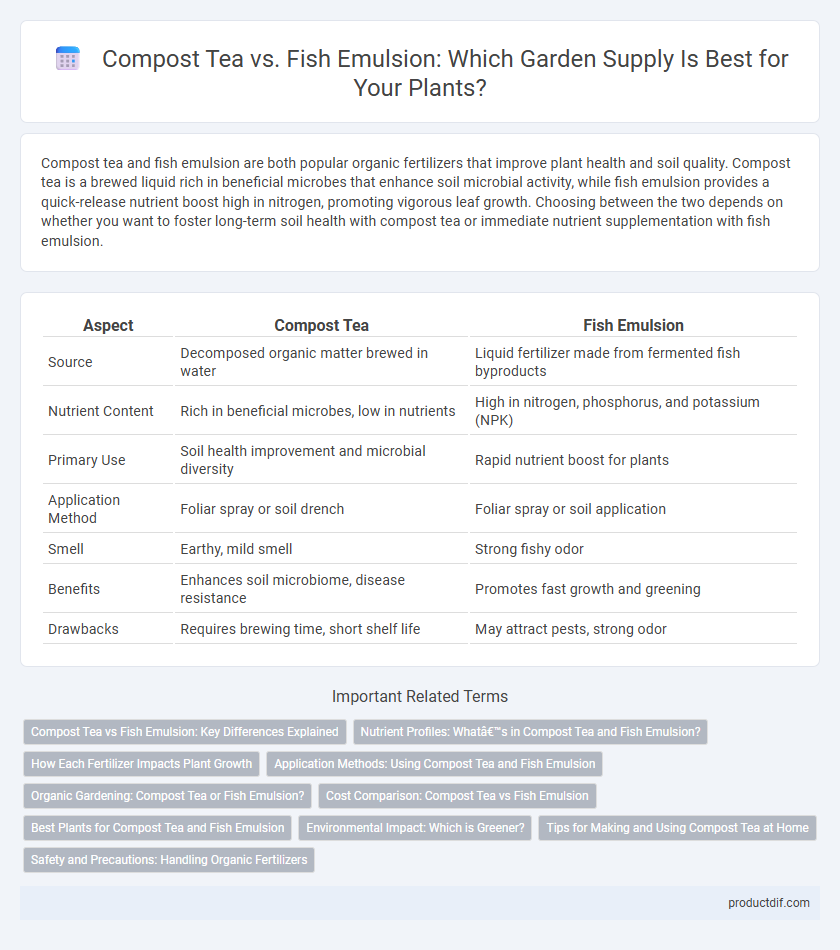Compost tea and fish emulsion are both popular organic fertilizers that improve plant health and soil quality. Compost tea is a brewed liquid rich in beneficial microbes that enhance soil microbial activity, while fish emulsion provides a quick-release nutrient boost high in nitrogen, promoting vigorous leaf growth. Choosing between the two depends on whether you want to foster long-term soil health with compost tea or immediate nutrient supplementation with fish emulsion.
Table of Comparison
| Aspect | Compost Tea | Fish Emulsion |
|---|---|---|
| Source | Decomposed organic matter brewed in water | Liquid fertilizer made from fermented fish byproducts |
| Nutrient Content | Rich in beneficial microbes, low in nutrients | High in nitrogen, phosphorus, and potassium (NPK) |
| Primary Use | Soil health improvement and microbial diversity | Rapid nutrient boost for plants |
| Application Method | Foliar spray or soil drench | Foliar spray or soil application |
| Smell | Earthy, mild smell | Strong fishy odor |
| Benefits | Enhances soil microbiome, disease resistance | Promotes fast growth and greening |
| Drawbacks | Requires brewing time, short shelf life | May attract pests, strong odor |
Compost Tea vs Fish Emulsion: Key Differences Explained
Compost tea is a liquid solution brewed from compost that contains beneficial microorganisms to improve soil health and plant growth, while fish emulsion is a nutrient-rich fertilizer made from processed fish byproducts, primarily providing nitrogen for rapid plant development. Compost tea promotes microbial activity and enhances nutrient availability over time, whereas fish emulsion delivers immediate nutrient boosts, especially nitrogen, phosphorus, and potassium. Gardeners choose compost tea to build long-term soil fertility and fish emulsion for quick nutrient supplementation during peak growing seasons.
Nutrient Profiles: What’s in Compost Tea and Fish Emulsion?
Compost tea contains a diverse array of micronutrients, beneficial microbes, and organic matter that enhance soil health and nutrient availability, while fish emulsion provides a concentrated source of nitrogen, phosphorus, and potassium derived from fish byproducts. The nutrient profile of compost tea varies depending on the compost ingredients, fostering microbial diversity, whereas fish emulsion delivers quick-release nutrients, particularly nitrogen for leaf growth. Gardeners often choose compost tea for long-term soil vitality and fish emulsion for rapid nutrient supplementation.
How Each Fertilizer Impacts Plant Growth
Compost tea enriches soil microbiology by introducing beneficial microorganisms that improve nutrient uptake and enhance root development, leading to healthier and more resilient plants. Fish emulsion delivers a quick-release source of nitrogen and trace minerals, promoting rapid foliage growth and vibrant color in plants. Using compost tea fosters long-term soil health, while fish emulsion provides an immediate nutrient boost, making their impacts complementary in supporting plant growth.
Application Methods: Using Compost Tea and Fish Emulsion
Compost tea is typically applied as a foliar spray or soil drench to enhance microbial activity and nutrient uptake, promoting plant health and disease resistance. Fish emulsion is primarily used as a liquid fertilizer, applied directly to the soil or as a foliar feed, providing a quick release of nitrogen and essential micronutrients. Both supplements require dilution with water to avoid plant burn, with application frequency depending on the crop type and growth stage.
Organic Gardening: Compost Tea or Fish Emulsion?
Compost tea and fish emulsion are both effective organic fertilizers, but they offer different benefits for soil health and plant growth. Compost tea enriches soil microbiology, promoting beneficial microorganisms that improve nutrient uptake, while fish emulsion provides a quick nitrogen boost essential for leafy plant development. Choosing between these depends on whether the focus is on enhancing soil ecology or supplying immediate nutrient availability in organic gardening.
Cost Comparison: Compost Tea vs Fish Emulsion
Compost tea typically costs between $10 to $30 per gallon depending on the nutrient concentration and preparation method, making it a budget-friendly option for organic gardeners. Fish emulsion prices range from $15 to $40 per gallon, reflecting its concentrated nutrient content and fast-acting benefits. Evaluating cost-effectiveness involves considering the application frequency, nutrient density, and desired plant growth outcomes.
Best Plants for Compost Tea and Fish Emulsion
Compost tea is highly effective for leafy greens and vegetables such as lettuce, spinach, and tomatoes due to its rich microbial activity that enhances soil health and nutrient uptake. Fish emulsion, rich in nitrogen and trace minerals, is ideal for flowering plants and fruit-bearing crops like roses, peppers, and strawberries, promoting vigorous growth and improved yields. Both fertilizers complement each other by targeting different plant needs, optimizing garden productivity when applied appropriately.
Environmental Impact: Which is Greener?
Compost tea and fish emulsion both enhance soil health, but compost tea offers a greener environmental profile due to its reliance on organic waste materials and minimal processing, reducing carbon footprint and chemical runoff. Fish emulsion, derived from fish byproducts, can contribute to overfishing concerns and emits higher greenhouse gases during production. Choosing compost tea supports sustainable gardening by promoting microbial diversity and nutrient recycling without depleting marine resources.
Tips for Making and Using Compost Tea at Home
For making compost tea at home, use high-quality, mature compost rich in beneficial microbes and aerate the mixture for 24-48 hours to maximize microbial growth. Apply compost tea to garden soil or plants early in the morning or late afternoon to enhance nutrient absorption and reduce UV exposure. Avoid using fish emulsion at the same time to prevent nutrient overload and maintain soil microbial balance.
Safety and Precautions: Handling Organic Fertilizers
Compost tea is generally safer than fish emulsion due to its lower concentration of pathogens and reduced risk of phytotoxicity when properly brewed and aerated. Fish emulsion requires careful handling because of its strong odor, high nitrogen content, and potential to cause leaf burn if overapplied. Both fertilizers demand protective gloves and adequate ventilation during application to minimize exposure to skin irritation and respiratory issues.
Compost tea vs Fish emulsion Infographic

 productdif.com
productdif.com